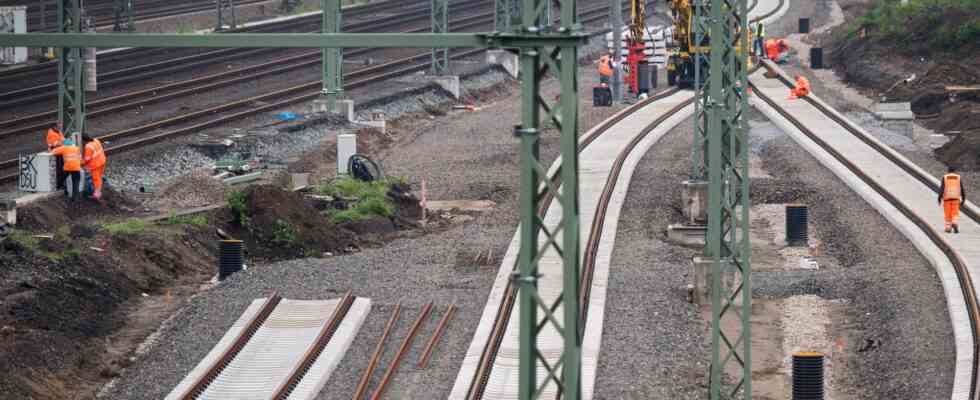Status: 15.09.2022 5:36 p.m
Making the railways more reliable again for passengers and freight customers will take many years of effort. Now it is becoming more concrete how and where the ailing network is to be renovated: the Frankfurt-Mannheim route is the first.
Something urgently needs to be done on the railways – all participants of the “Rail Summit” agreed on this point. Around 200 experts from politics, business and transport associations met in Berlin to discuss how the dilapidated rail network can be overhauled as quickly and comprehensively as possible. To this end, a coordinated renovation and digitization of the rail network is to be promoted.
“I don’t really want to hear the announcement that the reason for the delay is a disruption in operations,” said Federal Transport Minister Volker Wissing. Around 50 percent of all delays were due to this.
Not many small construction sites, but a large renovation
In order not to have to keep blocking important routes for individual construction sites, the work is to be combined in the future: the so-called Riedbahn between Frankfurt am Main and Mannheim will start in mid-2024. The important ICE route will be completely closed and renewed for half a year in 2024, including all train stations – for half a billion euros. Based on this model, further important railway lines are to be gradually renewed by 2030.
The section is of great importance for the entire railway network. A fifth of nationwide long-distance trains and a quarter of passengers use it. “Disturbances on the Riedbahn radiate maximum to the entire network,” said Bahn board member Berthold Huber. After the general renovation, the section will be spared major construction work for the next decade.
Operation on the main artery
Wissing compared the project to an operation on a main artery. Even if this initially means further restrictions for rail customers, the minister sees no other solution: the new procedure will bring noticeable improvements in the foreseeable future, he promised after the meeting.
No Germany clock possible without renovation
From Wissing’s point of view, the general renovation is a prerequisite for the desired Germany cycle. By 2030, this envisages a system with better coordinated transfer connections between the major cities. It is now necessary to “bring together a lot of loose threads” – i.e. further digitization of interlockings, train control technology and capacity management for the network, route modernization and network expansion. These should not stand side by side, but should be systematically coordinated with each other in the future.
Industry pushes for improvements
Business associations are also pushing for improvements: The railways play a “major role” in competitiveness and the achievement of climate targets in Germany, explained the industry association BDI. The construction industry called on the federal government to present reliable financing for the renovation of the railway network.
Consumer advocates take a critical view of the “Rail Summit” and warn Wissing “not to pick up on his predecessor’s summititis, which rarely led to groundbreaking solutions”. Marion Jungbluth from the Federal Association of Consumers told the “Handelsblatt” in the run-up to the meeting that it was correct to declare the rehabilitation of the rails a top priority – but ultimately what counted was “what people get”. Quality monitoring by a “central and independent body” is necessary, which also measures customer satisfaction. What passengers have had to experience in the past few months “on trains and on platforms is not suitable for inspiring new passengers to travel by train”.
Rail summit in Berlin: German railway network is to be “generally renovated”.
Jim-Bob Nickschas, ARD Berlin, September 15, 2022 at 4:41 p.m

